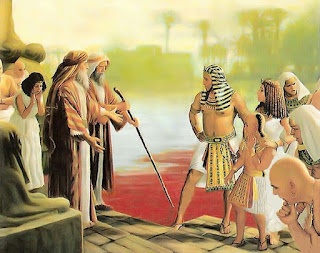The Story Of Moses
Reluctantly, Moses returned to Egypt and confronted Pharaoh, demanding the release of the Hebrew slaves. Pharaoh refused, and God unleashed a series of plagues upon Egypt, culminating in the death of the firstborn sons. Finally, Pharaoh relented, and Moses led the Israelites out of Egypt in what became known as the Exodus.The journey through the wilderness was arduous, with the Israelites facing hunger, thirst, and numerous challenges. Despite this, Moses remained steadfast in his faith and leadership, receiving guidance and laws from God along the way. He famously received the Ten Commandments on Mount Sinai, which formed the basis of Israelite law and morality.
Despite his close relationship with God, Moses faced challenges and doubts. At times, he struggled with the rebelliousness of the Israelites, who often complained and disobeyed God's commands. In one notable incident, Moses struck a rock in frustration to bring forth water, disobeying God's instructions, which ultimately led to him being prohibited from entering the Promised Land.As the Israelites neared the end of their journey, Moses delivered a series of speeches, known as the Deuteronomy, in which he recounted their history and reiterated God's laws. He also appointed Joshua as his successor, ensuring the continuation of leadership after his death.
Moses's death is recorded in the Bible as occurring just before the Israelites entered the Promised Land. He climbed Mount Nebo, where God showed him the land from a distance before he passed away. Despite not entering the Promised Land himself, Moses's legacy endured, with his leadership and teachings shaping the faith and identity of the Israelite people for generations to come.Overall, the story of Moses in the Bible is one of courage, faith, and obedience to God's will. From his miraculous birth to his leadership of the Israelites through the wilderness, Moses remains one of the most significant figures in Judeo-Christian history, revered for his role in delivering God's people from bondage and guiding them towards their destiny.
The story of Moses in the Bible is a lengthy narrative that spans several books, primarily Exodus, Leviticus, Numbers, and Deuteronomy. Here's a condensed version of Moses's story:
1.Miraculous Birth: Moses was born during a time when Hebrew male infants were being killed by the Egyptian Pharaoh's decree. His mother saved him by placing him in a basket and sending him down the Nile River, where he was found and adopted by Pharaoh's daughter.
2.Raised as an Egyptian Prince: Moses grew up in the palace as an Egyptian prince, receiving education and training befitting his status.
3.Discovering His Heritage: As an adult, Moses discovered his Hebrew heritage and was moved to action when he witnessed an Egyptian taskmaster mistreating a Hebrew slave. In a moment of anger, he killed the taskmaster and fled into the wilderness to escape Pharaoh's wrath.
4.Encounter with God: While in the wilderness, Moses encountered God in the form of a burning bush. God called him to lead the Israelites out of slavery in Egypt.
5.Confrontation with Pharaoh: Reluctantly, Moses returned to Egypt and confronted Pharaoh, demanding the release of the Hebrew slaves. Pharaoh refused, and God unleashed a series of plagues upon Egypt, culminating in the death of the firstborn sons. Finally, Pharaoh relented, and Moses led the Israelites out of Egypt in what became known as the Exodus.
6.Journey through the Wilderness: The journey through the wilderness was arduous, with the Israelites facing hunger, thirst, and numerous challenges. Despite this, Moses remained steadfast in his faith and leadership, receiving guidance and laws from God along the way.
7.Receiving the Ten Commandments: Moses famously received the Ten Commandments on Mount Sinai, which formed the basis of Israelite law and morality.
8.Challenges and Doubts: Despite his close relationship with God, Moses faced challenges and doubts. At times, he struggled with the rebelliousness of the Israelites, who often complained and disobeyed God's commands.
9.Appointing Successors: As the Israelites neared the end of their journey, Moses delivered a series of speeches, known as the Deuteronomy, in which he recounted their history and reiterated God's laws. He also appointed Joshua as his successor, ensuring the continuation of leadership after his death.
10.Death and Legacy: Moses's death is recorded in the Bible as occurring just before the Israelites entered the Promised Land. He climbed Mount Nebo, where God showed him the land from a distance before he passed away. Despite not entering the Promised Land himself, Moses's legacy endured, with his leadership and teachings shaping the faith and identity of the Israelite people for generations to come.















No comments